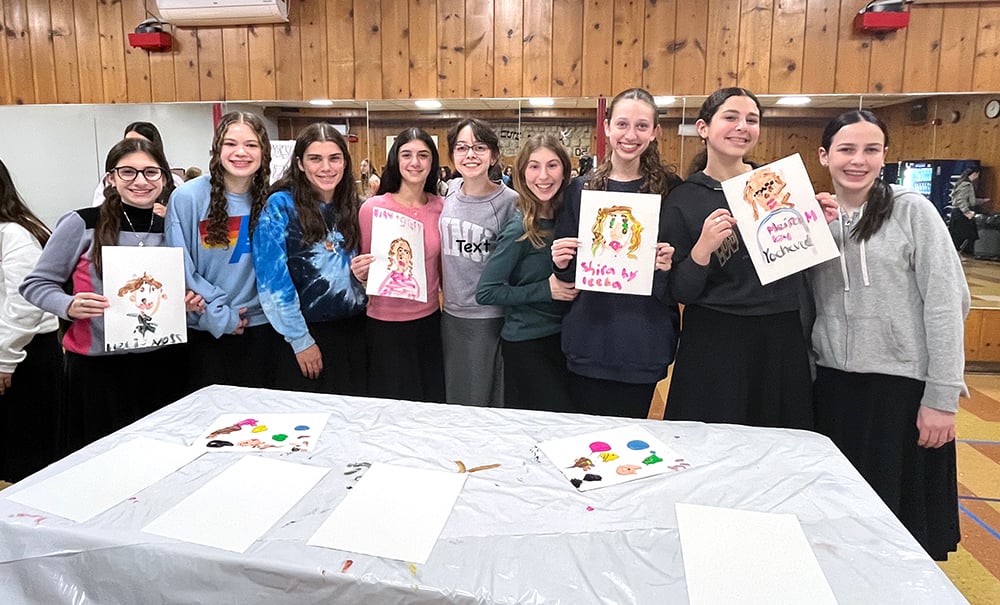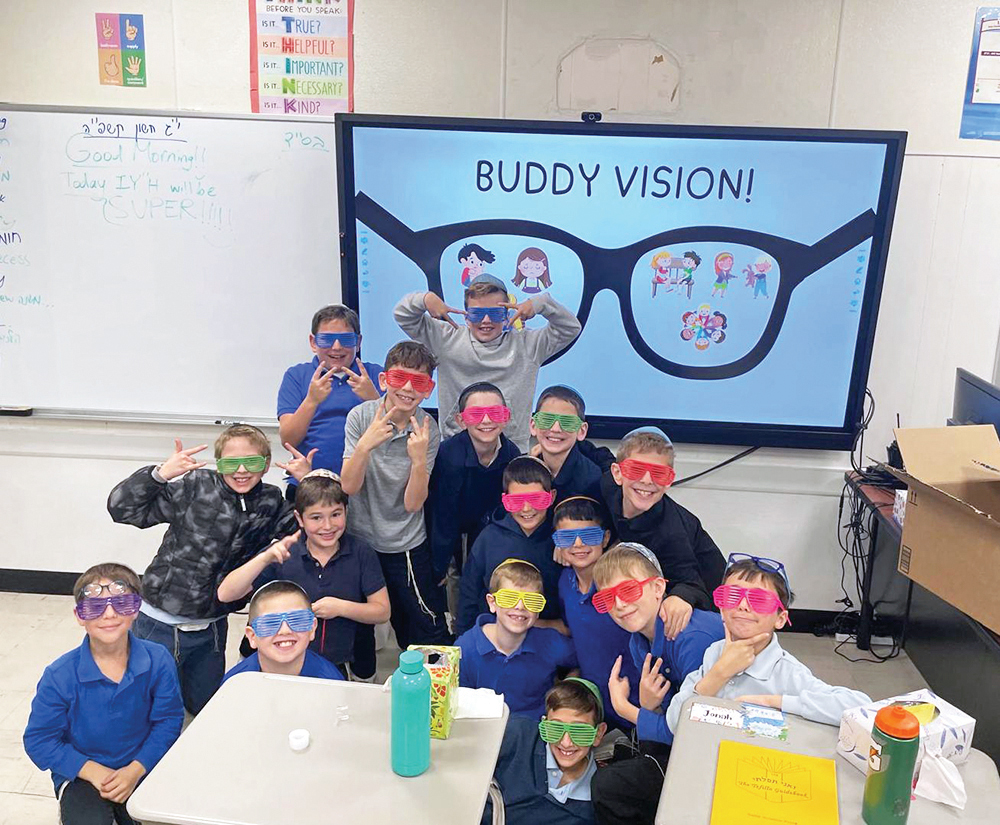Healthcare Foundation of New Jersey supports JEC’s pioneering student mental health work.

The Jewish Educational Center in Elizabeth recently announced their receipt of a one-year, $150,000 grant award from the Healthcare Foundation of New Jersey. The award represents an unprecedented recognition of pioneering work by the JEC in supporting student well-being. The grant will be used to enhance comprehensive social-emotional learning and mental health programming for students across the JEC’s academic divisions: the JEC Lower School, the JEC Middle School, the JEC High School and Bruriah High School for Girls.
Rabbi Pinchas Shapiro, JEC’s executive vice president, said: “The JEC already has a robust social-emotional learning program and mental health support systems for students. This grant will enable the JEC to provide greater levels of integrated support across five key areas. Specifically, the grant will help the JEC solidify our advisory program for grades 3-12, ensuring that every student has a trained adviser focused on supporting their emotional well-being and development.”

Allocation of grant funds is often simultaneously a blessing and a challenge, as many school administrators would say, because the needs are so great and multiple priorities “top the list.” However, with JEC’s programming already in place, Shapiro noted, “our focus is to provide the most comprehensive program and individual support … for every student in every grade and at every stage of academic and emotional growth. Grant funds are being utilized to fund our advisory program, curricular instruction, experiential learning, training and assessment. Children are constantly learning and growing in the classroom, out of the classroom and at home.”
Dr. Shira Hammerman, director of faculty learning, elaborated on the objectives of the grant. “The intended impact of the grant is to create a holistic learning environment where students are guided by a knowledgeable and supportive school community to develop the necessary skills and dispositions to maintain their sense of wellness as they face life’s challenges,” she said. “We are enhancing our formal learning experiences to ensure that skills and content are scaffolded across grade levels and divisions. We are reinforcing those formal social-emotional and mental health lessons by infusing our informal programming with purposeful experiential learning opportunities.”
Hammerman explained that in order to prepare faculty and guidance staff to administer the programming, they first engage in the training and support required to enable them to listen to and advise students, and to implement related curricula and programs. “Each division’s administrative team will implement services and materials as appropriate for their students, staff and parents.”

Dr. Seema Dobin, director of guidance at the JEC Lower School, shared, “With this grant, the JEC Lower School has been able to expand the guidance department, bringing in social worker Kayla Koyfman, MSW.” Working side by side, the two are enhancing and increasing the amount of direct counselor-to-student time, including one-on-one school-based counseling, social skills groups during lunch, and social and emotional learning in the classroom. Koyfman also coordinates programming for the Lower School.
Addressing the pervasive scourge of bullying, Dobin said: “There are multiple ways to address bullying. Often when a child is engaging in bullying behaviors, it is due to them not feeling good about themselves and taking it out on others. Through creating an environment where we champion filling each other’s ‘buckets’ and promote prosocial skills, ultimately we are preventing the underlying reasons bullying would occur. The guidance department works hand in hand with students, teachers and the administration to tap into each student’s ‘bucket’ to monitor and ensure that each student is feeling good about themselves and support those students who need extra care.”
Rabbi Yoni Korbman, director of guidance at the JEC High School and Middle School, added: “The boys’ middle school division now has their own social worker, Rabbi Yoni Leykin, a JEC alumnus. Rabbi Leykin provides myriad consistent and effective services. He counsels students, consults with parents, collaborates with classroom teachers, and teaches a life-skills curriculum to students.” In addition, Leykin collaborates with Korbman, initiating programs to strengthen the bond between the middle and high schools. Their dual efforts seek to naturalize and ease the transition from middle school to high school for the eighth graders.

“The Big Brother program, for example, unites seventh and eighth graders with high school juniors in enjoyable team-building exercises, stimulating comradery and good times,” said Korbman. “It enables those coming into high school for the following year to already have a role model and mentor-like figure.” Via Big Brothers, the upperclassmen have a golden opportunity to nurture leadership qualities, to reflect on their own experiences as freshman and therefore cultivate greater sensitivity to their younger peers, noted Korbman.
Korbman also has single grade “check-ins” several times throughout the year to discuss topics and issues pertinent to that particular grade, gauge student sentiment on school and life, and address any particular challenges shared by the grade. He commented that these meetings also encourage students to engage more comfortably in discourse on particular matters within the dynamics of a like-minded group.
Grant allocation is also being utilized via parent Zoom meetings to increase mental health in the realm of parenting, because parents must first assure they’re secure and emotionally healthy in order to be of optimal assistance to their children. Therefore, one focus of the Zoom presentations is on parental education via periodic virtual parent education sessions in collaboration with the guidance department.
Another key professional in the grant allocation implementation is Dr. Sarah Mandelbaum, director of guidance at Bruriah High School and Middle School, who said: “The grant allows Bruriah to enhance the role of our grade advisers, who serve as the primary go-to person in each grade. They play a key role in integrating social-emotional learning and mental health support directly into their work with students. They oversee and support student’s academic success, social-emotional development, and religious growth and promote grade ruach and achdus in each grade.”
Mandelbaum shared that this is accomplished via frequent individual and group meetings. The grade advisers open the opportunity for strong relationships with students and support them in resolving personal, academic and spiritual challenges in weekly programs and in collaboration with the director of student life and the guidance department. Grade advisers participate in bimonthly check-ins with the guidance department and coordinate regularly with faculty to support students’ holistic growth.
The grant funds have also allowed Bruriah to host experts such as Temimah Zucker, LCSW, who led a session on body esteem and self-care. Zucker is a highly regarded contributor to The Jewish Link. The Atzmi program, run by the guidance staff, aids students in exploring identity and building self-worth. In January, Atzmi will also include sessions for parents and faculty to extend its impact.
Upcoming programs made possible by the grant include one by Dr. Regine Galanti on anxiety management and building resilience; Rahel Bayar on setting boundaries and includes a parent session; and Project SARAH and Shalom Task Force: both focused on relationship safety and education on healthy boundaries. Additionally, Bruriah will host CCSA (Communities Confronting Substance Use and Addiction) to address substance use awareness, with a corresponding parent education component. Further topics include bullying prevention, boundary-setting and respectful communication, which are embedded in these programs to foster empathy and reinforce an inclusive school culture.

Kayla Broth, Bruriah teacher, is the faculty adviser for the 2025 Bruriah stage production. She revealed that this year’s production will spotlight a prime example of how the grant is used to infuse social-emotional learning and mental health support into experiential programs. “The annual production has always been a space for students to explore, cultivate and bond over their strengths, talents and hobbies that are traditionally expressed outside the classroom,” she said.
The annual Bruriah production is a student-driven project that includes every girl in some capacity. “This year, we would like to harness that expression to transform the production into a space where students can reflect, process and think deeply about the war in Israel and how it has affected them or their family members directly,” Broth said. Aligning with the general theme of the grant programs, she explained that the production aims to foster personal and collective understanding and empathy, aid students in processing tragedy, engage with complex emotions and learn about the transformative power of rebuilding after loss. Through the creative outlets of music, art, dance, acting and writing, students will delve into these concepts. Grant funds will be allocated to purchase materials for the student leaders to create workshops and for art supplies to create meaningful and reflective scenery.









